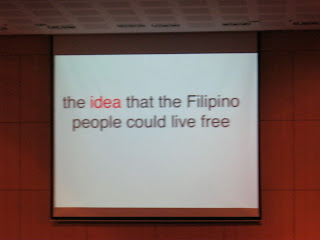The story behind TEDxKatips is the revolution that gave us freedom more than a hundred years ago, led by our heroes who believed in the 'idea that the Filipino could live free'.
And now, after more than a hundred years, a new revolution is being fought. Just as our heroes fought for our freedom more than a hundred years ago, TEDxKatips present 6 (six) modern day revolutionaries who are fighting for the idea that the Filipino people could live free- of poverty, corruption and mediocrity.
Dylan Wilk, CEO and Founder of Human Nature
Idea worth sharing: Love for country is the way to progress
Arriane Serafico, Blogger, Postura Project
Idea Worth Sharing: Wear Filipino, Stop Worrying and Start Jumping!
Arianne inspires in doing simple things in starting a revolution. 5 things you have to stop worrying about are: 1. "I'm not the best", 2. "Is my idea big enough?", 3. "Too many problems", 4. "Can I really change the world?", 5. "How do I start?". She started something by just simply doing and committing to something for 30 days, that is to wear something Filipino everyday. It's simple yet powerful, especially when you leverage on social media, your dream, and above all, jumping abilities ;]
John Chua, PWD (Photography With a Difference) Advocacy
Idea Worth Sharing: To understand and change the lives of Persons With Disabilities (PWD) thru the power of photography, social media and passion.
John Chua is a very talented photographer, the way he does magic in making pictures really worth more than a thousand words. But what is more inspiring (and magical) is his advocacy in changing the lives and adding value to PWDs or Persons With Disability, and even extends his passion in preserving our national heritage, such as Batad Rice Terraces. He asked why is nobody fixing the damaged terraces in Batad. Somebody responded and said they are still waiting for the budget from the government. Why, when the terraces was constructed by bare hands of our ancestors, and there wasn't even a government back then. He is right. Budget always impede us to take action. According to him, "when you have no budget, the sky is the limit". And he goes on to prove it really is.
Anna Oposa, Chief Mermaid, Save the Philippine Seas
Idea Worth Sharing: The worst global issue is apathy. Start taking actions and protect our major resource, our waters
More often than not, planning and action are overtaken by excuses: politics, budget, and who cares. What is inspiring is to see and hear someone who simply takes action, excuses or not. Her 'hobby', writing letters (pertaining to environmental woes, among others) really creates ripples that eventually become waves in mainstreaming awareness and understanding about our richest bio diversities. Sometimes it takes a 'no holds barred' approach to get your point across.
Mayor Pie Alvarez, San Vicente, Palawan
Idea Worth Sharing: Younger generation to take on Public service and 'wake up' the system
To be the chief executive of a municipality teeming with potential and a host of issues is a challenge in itself, and to take it on at such a very young age is inspiring, especially for those who have lost faith in our governance system. Not to take anything away from our 'experienced' politicians, but young minds really create dynamic possibilities by taking on unconventional yet simple approaches to problems, such as by simply asking- her story on how she conducted her campaign, instead of the traditional 'dreams and promises'.
Maria Ressa, CEO of Rappler
Idea Worth Spreading: Draw the line and say 'no' to corruption
It was a great eye-opener to hear her logic on how to 'fight' corruption. Outside, one is really faced by real challenges and temptations of corruption, especially with the common notion- "everybody does it", "it's the system, how can you fight it". Groups really play a big role in being able to confidently say 'No', and be able to curb the common notions- "Nobody does it", and "We can fight it".
It was great to see actual 'revolutions' taking place after more than a hundred years when we finally got our freedom. And its even better to see that we have never ran out of heroes and revolutionaries.
It's really more fun 'to be a changemaker' in the Philippines.









